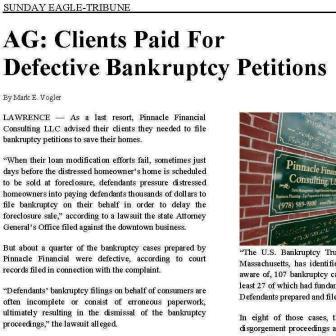
Bankruptcy petition preparers offer an option sort of like a guy in a trench coat selling wrist watches.
Bankruptcy petition preparers are not attorneys but offer ‘document preparation services’.
With a word processor and a computer, pretty much anyone can create a pile of paper.
But a troublesome issue looms where bankruptcy petition preparers create a legal court document, but do so without legal advice placing the bankruptcy petition into perspective of bankruptcy law and procedure.
Bankruptcy Petition Preparers – No Legal Advice
Unlike attorneys, by law, bankruptcy petition preparers may not:
- Represent bankruptcy filers in court.
- Offer advice on whether to file under chapter 7, 13 or another chapter.
- Offer an opinion of which debts will be discharged.
- Give advice on property such as a car or a home and whether the debtor will keep them after bankruptcy.
- Give advice on tax consequences.
- Give advice on strategy or reaffirmation agreements on cars or other assets.
These acts are prohibited by the U.S. Bankruptcy Code. [11 U.S.C. 110(e)(2)].
Like buying a wristwatch from a guy on the street, consumers might save a few bucks. But, what do they do when the watch stops or turns out fake?
Legal Advice – Bankruptcy Attorneys
Bankruptcy attorneys by law are required to explain the differences between the various chapters under the bankruptcy law. Unlike bankruptcy petition preparers, attorneys can also:
- Explain legal exemptions allowing property to be retained after bankruptcy.
- Answer questions about debt and expenses on the 7 page mandatory means test.
- Help meet filing requirements and deadlines.
- Decide whether you qualify for avoidance of liens.
- Give advice on ownership issues with jointly owned property and businesses.
- Give advice about what expenses are considered “reasonable”.
- Prevent accusations of bankruptcy fraud.
It is the difference between mechanically typing up papers and comprehensively drafting a valid document with perspective over bankruptcy law and procedure.
Defective Bankruptcy Petition Preparer
The Massachusetts Attorney General has brought suit against a Lawrence, MA bankruptcy petition preparer, bringing an injunction prohibiting it from soliciting or receiving fees for bankruptcy petition preparation or other related work. The suit identifies 107 bankruptcy cases initiated by the preparation service, 27 of which had fundamental defects.
One debtor told a newspaper reporter she was given no “opportunity to meaningfully review the documents” as she was rushed to sign next to sticky notes. [Sunday Eagle-Tribune, March 24, 2013, p. A7.] Less than a week later, that debtor was notified by the U.S. Trustee that the petition was “grossly deficient”.
The U.S. Trustee initiated “disgorgement” proceedings. This is an action to take profits back from the preparer who prepared the illegal petitions
Legal Advice From Bankruptcy Attorneys
Typical chapter 7 bankruptcy petitions average 50 pages. Chapter 13, including a plan, adds a few more pages. But, viewing the task of completing the petition and other documents as simple “legal document preparation” misses the point.
Those who file have individual financial circumstances that brought them to bankruptcy as an option. Only an experienced bankruptcy attorney can review all individual debt, income, assets and expenses and give meaningful advice. That legal advice allows bankruptcy filers to confidently navigate procedural and legal complexities of bankruptcy.
A theory dating back 100 years holds that a hypothetical chimpanzee typing at random for an infinite amount of time will eventually type out the complete works of Shakespeare. Do you want to take one of the earlier random ‘hunt and peck’ drafts as the basis for your fresh financial start?
Views: 4





If preparers are only to put down what a debtor informs them to put down then how can a preparer be in errors or guilty of error when in fact that they are only a typing service putting down information form the debtor. Answer the question attorney. I recommend you to stop bashing preparers and spend more time becoming a better salesman and “debt relief agency”.
Here’s the problem: Attorneys have a duty to provide the best possible advice and to zealously represent the client. As such, simply putting down what the debtor informs them is not enough. In carrying out our duty we ask debtors tons of questions designed to ferret out the full truth of the debtor’s financial situation including all income, debt, expenses and assets. Just taking down what the debtor says does not serve the best interest of the debtor. In the case discussed in this blog the court found the petition preparers filed defective petitions which harmed the debtors. The preparation service was ordered shut down and to return money paid by debtors.